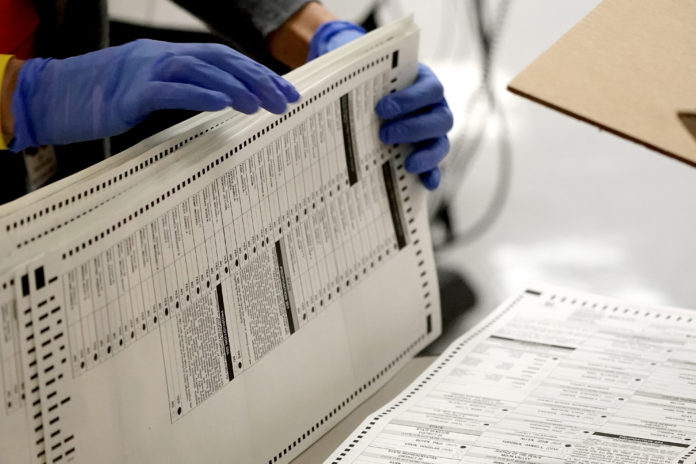
Republicans in the Arizona Senate voted Monday to require voters to include identification paperwork with their mailed ballots, insisting their motives aren’t racist as Democrats contended the measure would have an outsized impact on voters of color.
The measure is one of the most controversial of dozens of election bills introduced this year in Arizona. It comes as Republican-controlled legislatures around the country add new voting requirements after President Donald Trump lost his re-election bid in November and his supporters tried to cast doubt on the outcome.
The measure approved Monday would impose a new step in the process for mail voting, which now accounts for 80 percent of the ballots cast in Arizona. Voters would have to include an affidavit with their birthdate and the number from their driver’s license, state ID, or tribal identification card.
If they don’t have one of those forms of ID, they could include their voter registration number and a copy of a utility bill. The same forms of ID are required to vote in person.
The bill was approved along party lines after a fiery debate that released weeks of pent-up tension over the barrage of voting bills that Republicans say would ensure secure elections. Democrats argued that the voter-ID bill and others would lead to fewer people voting and more ballots being rejected.
“This will hurt my community. This will hurt my neighborhood,” state Sen. Martin Quezada of Glendale, who is Latino, said of the ID bill. “And the people who look like me and vote like me, this will hurt us.”
Democratic Sen. Victoria Steele of Tucson said the measure would perpetuate systemic racism.
“I’m not calling anybody here a racist,” Steele said. “What I am saying is when policies disproportionately impact communities of color, we have to look at that.”
Republicans say they’re responding to concerns from their constituents over the accuracy of the vote count.
“It feels like what you’re asking us to do is to make elections as open as possible … and look the other way when there are irregularities,” said Republican Sen. Kelli Townsend of Apache Junction.
No evidence of widespread problems have been uncovered in several lawsuits filed by Trump supporters and repeated audits of results in Maricopa County.
Critics of the bill said including ID with a ballot would be a significant barrier that voters aren’t used to, and some are bound to have their ballot invalidated because of a mistake. The voters most likely to lack a driver’s license or printer to provide the necessary ID are people of color, those with low incomes, and younger and older voters, Democrats said.
“This is inevitably going to result in some votes not being counted. It could be dozens, could be hundreds, could be thousands,” said Sen. Sean Bowie, an Ahwatukee Democrat. “That extra piece of paper, I’m concerned it’s going to get lost.”
Voters who forget to bring the proper ID to a polling place can go home and get it, but those who forget to include it with their mail ballot may not have a chance to correct it, Bowie said.
Republicans downplayed the impact and rejected accusations that the measure would disenfranchise voters.
“I don’t read in this bill that something’s going to be taken away from a voter,” said Sen. Michelle Ugenti-Rita, a Scottsdale Republican. “They’re simply going to have to identify themselves in a different method.”
Sen. J.D. Mesnard, a Chandler Republican who sponsored the bill, said voters should default to casting ballots in person, but if they want to use a mail ballot, they should follow the same ID requirements.
“If the integrity of the election system is shot if they don’t believe the results, why will they go and vote?” Mesnard said. “That suppresses vote in a whole other perspective. So I guess in some ways, no matter how you look at it, you’re suppressing votes by some logic.”
Sen. Tyler Pace, a Republican from Mesa, said he supported the bill despite concerns that it would reduce secrecy in the mail-voting process. Election workers would be deciding whether the identification is sufficient after opening the envelope and potentially seeing how the person voted, he said. Under current law, election workers can’t see the ballot when they verify the validity of the signature on the outside of the envelope.
Pace said Mesnard promised him the issue will be addressed in the House.
Meanwhile, GOP senators also voted along party lines to give Republican Attorney General Mark Brnovich $1 million to investigate antitrust and voting integrity issues.
Republicans said Brnovich has received thousands of complaints that need to be addressed, while Democrats say the measure furthers the myth that the election was marred by irregularities.
Republished with the permission of the Associated Press.













